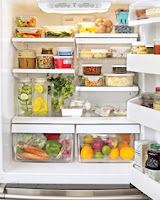Try not to store too much food, be it fresh, frozen or already cooked. It's great to cook in advance and have dinner/lunch/snack ready, but be aware of the longer the food is stored the less nutrition it will keep. A proportion of the food's goodness is lost during the cooking process and then further destroyed by coming into contact with the air where it has become slowly oxidized and broken down.
You can freeze fresh fruit and vegetables but make sure they are left whole rather than chopped so that the nutritional blanket which envelopes them remains intact. Most food should be frozen raw, although blanching is also effective: because it kills the foods resident microbes, this will then remain healthy for a few days longer. However, try not to freeze any food (fresh and chopped food) for more than ten days so that all the minerals and vitamins are still active when it's eaten. This is of course, sometimes impossible, but try to use your food. Don't shop for a month, shop for a maximum a week, or preferably days.
If you have a family and they are not joining you on the Dairy/Gluten/Soy free food plan, it helps psychologically, to have a separate shelf in the fridge or the cupboard for your food. In this way, all the provisions for the rest of the family, such as butter, milk products, sugary cereals, coffees and teas, are not there to cause temptation when you are most vulnerable. But don't feel you have to avoid the family altogether; I will show how you can integrate your menus with those of other members in your household and get everyone eating healthier.
One final note on a key point: we cannot overstate the importance of washing all fruit and vegetables before you use them, to make sure that they have been thoroughly cleansed of all chemical residues left over from the farming process. The Whole Health Organization (WHO) has listed over two thousand known pesticides that are used around the world to stop insects from destroying crops. Most of these will find their way into the supermarket - on food. The reports shows that in the US alone, around 25,000 tons of pesticide are used in conventional farming. An apple, for instance, may have been sprayed 16 times with 36 different chemicals. All these toxic chemicals, therefore, need to be cleaned from your food before you eat it.
So clean out your fridge, get rid of stains, humidity, mold, old leftovers or past expiration date items. Keep it clean and fresh!


No comments:
Post a Comment